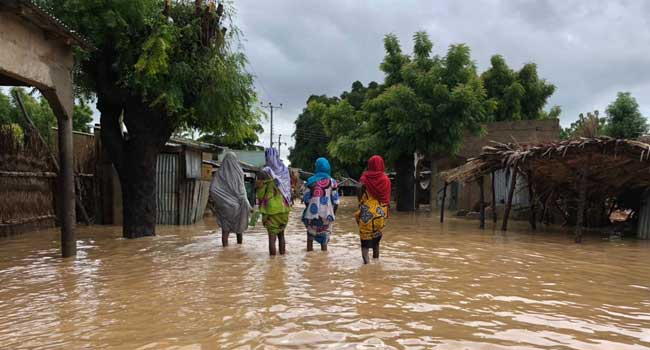The Nigeria Hydrological Services (NIHSA) has blamed sub-nationals including state and local governments for disregarding “adequate and timely warnings” and weather advisories issued by the various Federal Government agencies such as NIHSA and the Nigerian Meteorological Agency (NiMet) to avert flood disaster in 2022.
“If our predictions were heeded by relevant sub-nationals, we will not have been where we are today but I am believing that following this year’s flood disaster across the land, the consciousness of relevant actors especially sub-nationals will be awakened to do the needful once they receive all these advisories,” NIHSA Director General, Clement Nze, said on Channels Television’s breakfast show, Sunrise, on Saturday.
He also said the Minister of Water Resources, Suleiman Adamu, earlier in the year wrote letters to state governors informing them of the impending devastating floods of 2022 but some of the governors did not heed the warning.
Nze said, “They (weather predictions) were out early enough to set the tone for what to expect in the course of the year. The Nigerian Meteorological Agency came out with February 15 to paint the picture of what to expect most likely and my own agency, Nigeria Hydrological Services, later followed suit.
“The Minister of Water Resources that gave the unveiling of the prediction, the annual flood outlook, issued warnings, issued letters to each state government in Nigeria and relevant ministries like agriculture, environment and aviation, informing them the specific locations in their states they should watch out for during the rainy season.
“The letters were authored by him (minister), signed and sent to the governors, they were informed and the necessary measures they ought to take.”
Over 300 Killed, Thousands Displaced…

Massive flooding has been experienced in many coastal and non-coastal parts of the country in the last few weeks due to excessive floods and inflow from external places like Cameroon. Over 300 people have been killed by devastating floods across Nigeria in 2022, according to the National Emergency Management Agency (NEMA).
Hundreds of communities have been submerged in Delta, Anambra, Bayelsa, Adamawa, Taraba, Benue, Kogi, Jigawa, Kano, Sokoto, amongst others with thousands of residents displaced and hectares of farmlands washed away, a development that analysts have opined could aggravate food crisis.
NEMA also warned that the 2022 flood disaster will be worse than that of 2012 when at least 363 people were killed and over 2.1 million people were displaced by floods.
READ ALSO: It’s A Miracle Nigeria Is Still One, Adeboye Declares Seven Days Prayer
However, the NIHSA boss said the magnitude could have been reduced should the right things be done including demolition of structures obstructing drainage, proper waste management, and many others.
‘State Govts Should Take Responsibility’
A NEMA Director, Onimode Abdullahi, who also spoke on the programme said the state government must take responsibility for what has happened.
According to him, town planning and waste management boards should have acted before the water overflowed the communities in their states and relocate residents from lowlands to higher grounds and safe zones.
“We need political will to drive this process at the sub-national level. It is unfortunate the flood has happened and the people have been moved out.
“It is hoped that with the lessons that will be learnt from the flood of 2022, the political will be strengthened to avert this kind of occurrence in the future,” he advised.
Food Scarcity Looms…

Similarly, the Secretary of HEDA Resource Centre, Sulaimon Arigbabu, said the massive flood has already affected food availability in the country.
According to him, farmers who are seasonally unemployed have looked forward to this period for harvest but their crops, especially grains, have been washed away by floods.
“There is going to be food scarcity because availability is an issue, the food that is available, the prices will skyrocket the more. So, if there is any strategic reserve by the Federal Government, this is the time to relax some certain laws around import,” he said.


